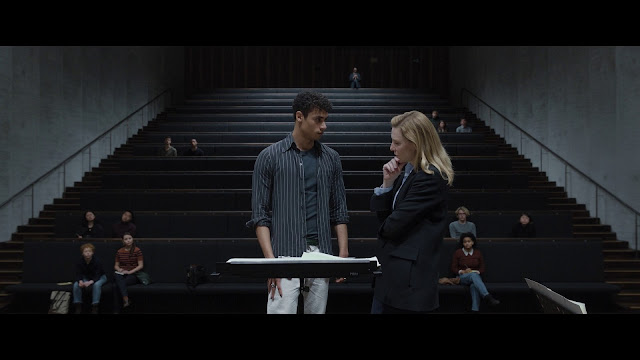 |
| Ronald Zehrfeld and Nina Hoss |
The German director Christian Petzold garnered some deserved attention for his 2012 movie Barbara, which told the story of an East German doctor (Nina Hoss) in the 1980s, banished to a country hospital as punishment for applying for an exit visa, who plots to defect but is sidelined by her emotional involvement in the case of a female patient. As a chronicle of life in East Germany in the years before the Berlin Wall came down, Barbara is smaller-scale than The Lives of Others – one of a small handful of movies since the millennium that truly deserve to be called masterpieces – but it demonstrates a piecing intelligence, a gift for working with actors (Hoss gives a superlative performance), and an easy mastery of film vocabulary. It’s an elegant and fiercely compelling piece of moviemaking, and I think that Phoenix, his new picture, is even better.
Petzold is again working with his co-writer on Barbara, Harun Farocki, and again features Hoss opposite the fine actor Ronald Zehrfeld, who played the head of the clinic Barbara is exiled to. In Phoenix Hoss, in a performance of profound tremulous feeling, plays Nelly Lenz, a Jewish cabaret singer who returns from the camps at the end of the Second World War so badly disfigured that she hides her face under a bandage. Her experience has left her so fragile that she barely seems able to function. She arrives back in Berlin under the care of another woman, Lene Winter (Nina Kunzendorf), who seems to have an administrative job that gives her access to government documents. (I think we’re meant to assume that Lene and Nelly met in the camps, but the movie is rather mysterious on the source of their association.) Lene guides her through reconstructive surgery that leaves her looking somewhat but not exactly like the woman she was before she was taken by the Nazis, and Lene makes plans for the two of them to emigrate to Israel. But Nelly didn’t think of herself as a Jew in the days before the Holocaust, and she still doesn’t. And what she wants is to find her Gentile husband Johnny, a pianist who hid her from the Gestapo in a boat until they finally caught up with her. Lene is convinced that it was Johnny who turned Nelly in at the end, but Nelly is still crazy about him and doesn’t believe her friend’s version of events. Haunting the seedier clubs, she locates Johnny (Zehrfeld), working not as a musician but as a waiter, and of course he doesn’t recognize her. But he notes her resemblance to his wife, who, he is certain, died during the war.





